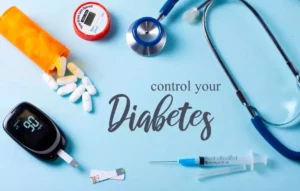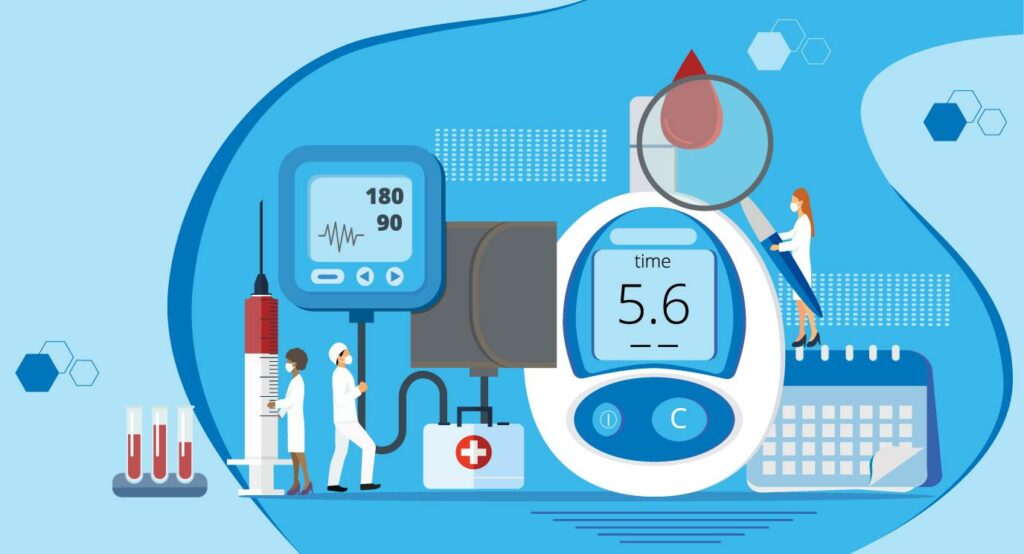Living with diabetes can be a challenging journey, but with the right knowledge and tools, it’s possible to manage this condition effectively and lead a healthy, fulfilling life. Diabetes, a chronic health condition affecting millions worldwide, demands careful attention to diet, lifestyle, and medical care. This comprehensive guide is designed to empower you with essential information and strategies to effectively manage diabetes. Here, we’ll explore the diabetes treatment plan, lifestyle adjustments, and supportive resources, providing a roadmap for a healthier tomorrow.
Contents
What is The Importance Of Diabetes Treatment Plan?
 The importance of a diabetes treatment plan cannot be overstated. Diabetes, a chronic condition characterized by high levels of sugar (glucose) in the blood, requires ongoing attention and care. A well-structured treatment plan is crucial for several reasons:
The importance of a diabetes treatment plan cannot be overstated. Diabetes, a chronic condition characterized by high levels of sugar (glucose) in the blood, requires ongoing attention and care. A well-structured treatment plan is crucial for several reasons:
- Blood Sugar Control
The primary goal of any diabetes treatment plan is to maintain blood sugar levels within a target range. This is essential to prevent the short-term and long-term complications associated with both high and low blood sugar levels.
- Prevention of Complications
Poorly managed diabetes can lead to a host of complications, including heart disease, kidney damage, nerve damage, eye problems, and stroke. A comprehensive treatment plan helps in reducing the risk of these serious complications.
- Enhanced Quality of Life
Effective management of diabetes allows individuals to maintain a higher quality of life. It helps in reducing symptoms like fatigue, excessive thirst, and frequent urination. And enables people to participate more fully in daily activities.
- Lifestyle Optimization
A diabetes treatment plan often includes lifestyle modifications such as diet changes, physical activity, and weight management. These changes not only help in managing diabetes but also contribute to overall health improvements, reducing the risk of other diseases.
- Education and Empowerment
A comprehensive plan educates individuals about their condition, treatment options, and self-care practices. This knowledge empowers them to take an active role in managing their health.
- Monitoring and Adjustment
Diabetes is a dynamic condition that can change over time. Regular monitoring as part of a treatment plan allows for timely adjustments in treatment, whether it’s medication, diet, or lifestyle changes.
Overall, a diabetes treatment plan is essential for effectively managing the condition, preventing complications, and maintaining a high quality of life. It requires a holistic approach that addresses the medical, lifestyle, and emotional aspects of living with diabetes.
Medical Approaches In Diabetes Treatment Plan
 Medical approaches in a diabetes treatment plan, specifically focusing on medications, play a pivotal role in managing the condition effectively. These medications are designed to either increase insulin sensitivity, decrease glucose production, stimulate insulin secretion, or directly supplement insulin levels. Here’s an overview:
Medical approaches in a diabetes treatment plan, specifically focusing on medications, play a pivotal role in managing the condition effectively. These medications are designed to either increase insulin sensitivity, decrease glucose production, stimulate insulin secretion, or directly supplement insulin levels. Here’s an overview:
Insulin Therapy
Necessity in Type 1 Diabetes: The body does not produce insulin, making external insulin essential for survival. It is also used in Type 2 diabetes when blood sugars are not controlled with oral medications.
Administration Methods: Insulin is administered through injections or an insulin pump, which delivers constant short-acting insulin and doses for meals.
Different Types: Rapid-acting insulin starts working within minutes and lasts a few hours, ideal for mealtime blood sugar control. Long-acting insulin provides a steady level of insulin throughout the day and night.
Oral Hypoglycemic Agents
Metformin: It is often the first medication prescribed for Type 2 diabetes. It works by decreasing glucose production in the liver and improving the body’s sensitivity to insulin. Metformin also has benefits for cardiovascular health.
Sulfonylureas and Meglitinides: These stimulate the pancreas to produce more insulin. They are effective but can sometimes cause low blood sugar (hypoglycemia), especially if meals are skipped.
Thiazolidinediones
These medications work by improving insulin sensitivity, particularly in muscle and fat tissue, and by slightly decreasing glucose production in the liver. They can be beneficial in controlling blood glucose levels but might have side effects like weight gain and increased risk of heart failure.
DPP-4 Inhibitors
DPP-4 inhibitors work by blocking the action of the DPP-4 enzyme. This destroys a group of gastrointestinal hormones. By preventing this destruction, these medications increase insulin release in response to meals and decrease the amount of glucose produced by the liver.
GLP-1 Receptor Agonists
These injectable medications mimic the effects of the GLP-1 hormone, which is involved in blood sugar regulation. They not only stimulate insulin release but also slow down digestion and decrease appetite, aiding in weight loss which can be beneficial in Type 2 diabetes management.
SGLT2 Inhibitors
SGLT2 inhibitors work by blocking the reabsorption of glucose in the kidneys, leading to its excretion in the urine. This unique mechanism can lead to a reduction in blood glucose levels without the risk of causing hypoglycemia and also assists in weight loss.
Combination Therapies
Many patients may require a combination of medications to effectively manage their diabetes. This approach can target different aspects of diabetes pathophysiology, leading to more effective blood glucose control.
Medication adherence, along with regular monitoring and adjustments in collaboration with healthcare providers, is key to effective diabetes management. It’s also important for patients to be educated about their medications, including how to take them, possible side effects, and how to recognize and manage these effects.
Lifestyle And Additional Strategies In Diabetes Treatment
 Lifestyle and additional strategies play a vital role in the comprehensive management of diabetes, complementing medical treatments and medications. These strategies are centered around diet, physical activity, weight management, and overall lifestyle adjustments. Let’s explore each of these areas in detail:
Lifestyle and additional strategies play a vital role in the comprehensive management of diabetes, complementing medical treatments and medications. These strategies are centered around diet, physical activity, weight management, and overall lifestyle adjustments. Let’s explore each of these areas in detail:
Dietary Management
- Carbohydrate Counting and Monitoring: Understanding and monitoring carbohydrate intake is crucial since carbs have the most significant impact on blood sugar levels. Learning to count carbs and understand their effect can help in better glycemic control.
- Healthy Eating Habits: Incorporating a balanced diet rich in whole grains, lean proteins, healthy fats, and plenty of fruits and vegetables. Limiting processed foods, refined sugars, and high-fat foods is also key.
- Portion Control: Managing portion sizes to avoid overeating, which can lead to weight gain and higher blood sugar levels.
- Consistency in Meals: Eating at regular intervals helps maintain stable blood sugar levels, especially for those on insulin or certain diabetes medications.
Physical Activity
- Regular Exercise: Engaging in regular physical activity such as brisk walking, cycling, swimming, or strength training. The American Diabetes Association recommends at least 150 minutes of moderate-intensity exercise per week.
- Impact on Blood Sugar and Insulin Sensitivity: Exercise helps the body use insulin more effectively and lowers blood glucose levels. It also aids in weight management.
- Monitoring Blood Sugar: It’s important to monitor blood sugar levels before, during, and after exercise, as physical activity can affect glucose levels.
Weight Management
- Importance in Type 2 Diabetes: Excess weight, particularly around the abdomen, can increase insulin resistance. Losing weight can significantly improve blood sugar control.
- Strategies: Combining a healthy diet with regular exercise. In some cases, bariatric surgery may be considered for those who are significantly overweight and have difficulty controlling their diabetes with lifestyle changes and medication.
Stress Management
- Impact on Blood Sugar Levels: Stress can affect blood sugar levels. Learning stress management techniques such as meditation, yoga, deep breathing exercises, or counseling can be beneficial.
Regular Sleep Patterns
- Influence on Glucose Metabolism: Poor sleep can affect blood sugar control and insulin sensitivity. Maintaining a regular sleep schedule and ensuring adequate sleep can improve overall diabetes management.
Avoidance of Harmful Habits
- Smoking and Alcohol: Smoking cessation is crucial as smoking can increase the risk of diabetes complications. If alcohol is consumed, it should be in moderation and with an understanding of how it can affect blood sugar levels.
Regular Health Check-Ups and Monitoring
- Importance of Regular Testing: Regular testing of blood glucose levels, along with regular check-ups for diabetes-related complications, is vital.
- Monitoring for Complications: Keeping an eye on potential diabetes complications, such as heart disease, kidney disease, eye problems, and neuropathy, is essential.
Education and Support
- Ongoing Education: Continually educating oneself about diabetes and staying updated with the latest information and treatments.
- Support Groups and Counseling: Joining support groups or seeking counseling can provide emotional support and practical advice for managing diabetes.
By incorporating these lifestyle and additional strategies into their treatment plan, individuals with diabetes can significantly improve their blood sugar control and overall health. Ultimately, reducing the risk of complications and enhancing their quality of life.
Conclusion
In conclusion, a diabetes treatment plan requires a comprehensive approach that combines medical treatments with lifestyle and additional strategies. Medications, whether insulin or oral drugs are tailored to individual needs and play a crucial role in controlling blood sugar levels. However, their effectiveness is greatly enhanced by adopting healthy lifestyle habits, such as a balanced diet, regular physical activity, effective weight management, stress reduction, and good sleep patterns.
Regular health check-ups and continuous education about diabetes are also essential. By integrating these medical and lifestyle elements, individuals with diabetes can lead healthier lives and better manage their condition. Do you want to get rid of diabetes? Join our online diabetes treatment program and reverse Diabetes naturally through lifestyle changes such as a Personalized Diet plan, Exercise, Yoga, dieticians, and health coaches.

